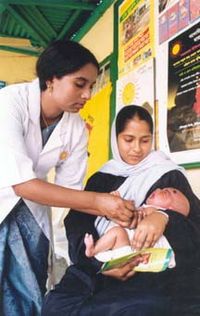
Photo from wikipedia
Objective This study explored the relationship of disease knowledge with glycemic control and self-care practices in adult Pakistani people diabetes (PWD). Methods People diagnosed with type 2 diabetes (n=218) were… Click to show full abstract
Objective This study explored the relationship of disease knowledge with glycemic control and self-care practices in adult Pakistani people diabetes (PWD). Methods People diagnosed with type 2 diabetes (n=218) were selected from three health care centers, located in different cities of Pakistan. Disease knowledge and self-care practices were assessed by Urdu versions of Diabetes Knowledge Questionnaire (DKQ) and Diabetes Self-Management Questionnaire (DSMQ), using a cross-sectional design. Chi-square and correlation analysis were applied to explore the relationship of disease knowledge with glycemic control and self-care practices. Linear regression was used to explore the predictors for disease knowledge. Results Majority of the sample was >45–60 years old (48.8%), suffering from type 2 diabetes mellitus for <5 years (49.5%) and had poor glycemic control (HbA1C≥7%; n=181 participants). Disease knowledge was significantly associated (p<0.05) with patient’s gender, level of education, family history of diabetes, nature of euglycemic therapy, and glycemic control. Correlation matrix showed strongly inverse correlations of DKQ with glycated hemoglobin levels (r=−0.62; p<0.001) and strongly positive with DSMQ sum scale (r=0.63; p<0.001). PWD having university-level education (β=0.22; 95% Confidence Interval (CI) 0.189, 0.872; p<0.01), doing job (β=0.22; 95% CI 0.009, 0.908]; p=0.046), and use of oral hypoglycemic agents in combination with insulin (β=−0.16; 95% CI [−1.224, −0.071]; p=0.028) were the significant predictors for disease knowledge. Conclusion Disease knowledge significantly correlated with glycated hemoglobin levels and self-care activities of PWD. These findings will help in designing patient-tailored diabetes educational interventions for yielding a higher probability of achieving target glycemic control.
Journal Title: Diabetes, Metabolic Syndrome and Obesity: Targets and Therapy
Year Published: 2019
Link to full text (if available)
Share on Social Media: Sign Up to like & get
recommendations!